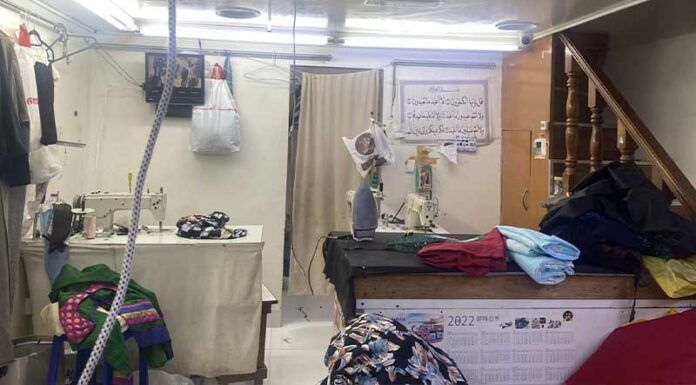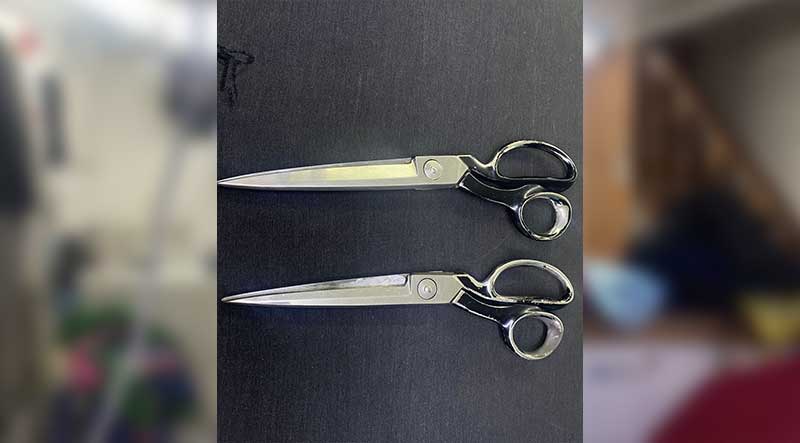By Hala Nasar
“I almost don’t think of him as a mortal. He was a magician…and I think he lives like that in my head.”
With wooden prayer beads in one hand and his trusty chipped fabric shears in the other, Mr. Mohammed created magic in a cramped sanctuary called “Naam Tailoring” in Um Altarafa, Sharjah. An ordinary tailor shop that blended in with the buzzing street and the usual throngs, was only visible because of its obnoxiously bright fluorescent lights and the magenta sign that adorns its storefront.
Only visible to those coming for Mr. Mohammed.
In the 20 times that Isabela Tavares visited him for a clothing alteration, Mr. Mohammed offered her Karak tea every single time. It was almost both comforting and comical how she watched him work in silence while sipping the sugary beverage in the corner of his shop.
Since he came from Mumbai to Sharjah in 1991, Mr. Mohammed communicated with his customers through the years in what can be best described as pidgin Arabic, a mixture of Hindi and Arabic. On the other hand, Tavares spoke English. However, despite the language barrier, she was successful in making him giggle a few times. They didn’t need much to communicate with each other.
Tavares leaned back in her chair, staring ahead as if picturing him in his little shop, “He didn’t waste words. It gave him an aura of wisdom and superiority.”
Over the years, they had developed their own language. During every theatrical show at the American University of Sharjah, she would visit him with her drawings and wild ideas, and he would always anticipate the challenge. When she would tell him what she needed with the kind of eyes only a costume designer with blind trust in her tailor harbored, he would nod, silently absorb her words, chew them up and ingest them before spitting them out in patterns and stitches.
It was as if what he lacked in communicating verbally, he was more than eloquent in communicating with his work. This proved to be true when Tavares realized that the man with the white beard and kind eyes had magic flowing through his fingertips. His shears spoke to him and his fabric danced to his voice.
At first, Tavares did not understand what it was he was doing. There she was, telling him her exceptional vision for a costume until he interrupted her to rummage through some scrap fabric lying on his cutting table. Watching him in curiosity, her words were cut short as his shears tore through the cloth in unabridged confidence. As a costume designer, she understood that he was cutting according to a pattern. Except that, there was no pattern. Nor measurements. Nor lines.
But there was a pattern. It was just invisible to the rest of us. There was a pattern that his hand had only memorized and was bringing to life. She waited; the only sounds in the shop were the fan, the sewing machine, and Tavares’ labored breathing.
Finally, a few minutes later, he opened up the fabric, picked it up as a way of displaying it, and looked at Tavares before saying “This what you want?”
And there it was, a miniature version of her request. A mini dress. A small, miniature, tiny dress, glistening under the white light.
There are some moments in life where it feels as if our conscious mind detaches from our body, rendering us incapable of throwing coherent words or phrases together. At that moment, all Tavares could verbalize in the most plain and primitive sense of the word was “Yes!”
She beamed, repeating herself, “That’s exactly…Yes. Exactly.”
And so, Mr. Mohammed nodded, her happiness was food for his soul.
Two years later
Soon after the COVID pandemic, the sun had set a little too early and the wind was unforgiving. Tavares started working on a new show and had gone to the shop, excited to show Mr. Mohammed the designs she drew for him to build after a long while.
The moment her foot touched the marble floor of the tight space, she felt the energy being sucked out of the room. There was something wrong. He wasn’t at his table. Mr. Mohammed was always at his cutting table in the middle of the shop, wearing a Shalwar Kameez pristinely pressed to perfection.
Her eyes were frantic, finally landing upon his sons who had stepped forward from the back of the shop to greet her. They were not used to standing in the front, it was their father’s spot. Every day, he would sit on his stool waiting for customers as he fidgeted with his prayer beads.
“Hi. Where’s your father?” she asked, weary.
The men exchanged a look that didn’t need much explanation. Tavares didn’t need to hear it. In fact, she didn’t want to. She simply knew. Suddenly, surrounded by mismatched fabrics and loud machines, she had the disturbing realization that she had put two of his family members in the position to tell yet another stranger that their father died of a heart attack.
Her fingers twitched at her sides and her chest was suddenly hollow of oxygen as she felt the indescribable urge to comfort the two men in front of her while simultaneously finding some comfort for herself. Her inability to express the crippling grief traveling through every cell in her body for a stranger who had she shared tea, laughs and ideas with sat heavily on her heart.
Right then and there, she understood that life was peculiar to have you grieve a stranger and your lost time with them. Her feet were glued to the floor, unable to move when it hit her that the pandemic took away years in which she could have worked with him.
“I thought we had more time,” she smiled sadly.
In the shop, his prayer beads hang on a metal bar over a poster of a prayer while his favorite shears lay on his cutting table, in their rightful place.
All his belongings find themselves scattered around the shop, left for his loyal workers and friends, yearning for the hands of their master to claim them once more.
He had taught everyone that worked under him the art of tailoring, instilling a phrase in their brains that he always said upon watching them work on a piece, “Yreed shoghol natheef,” a pidgin phrase which meant “I want clean work,” a distinct demand and desire for a carefully done job from his proteges and an infinite marker of his legacy.
Tavares blinked, her eyes welling up with uninvited tears. “He’s somewhere, you know? He’s somewhere…he’s somewhere else cutting little patterns and creating magic for other people,” she says with pained conviction.
Alas, he might have left the world, but in Tavares’ head, Mr. Mohammed lives on.



















